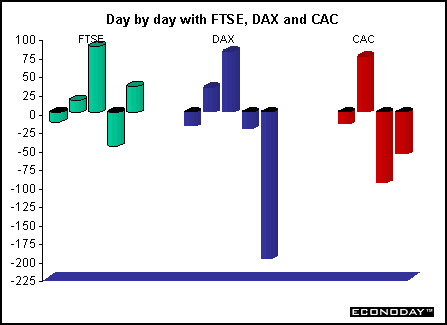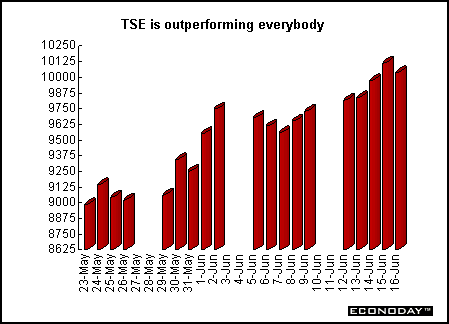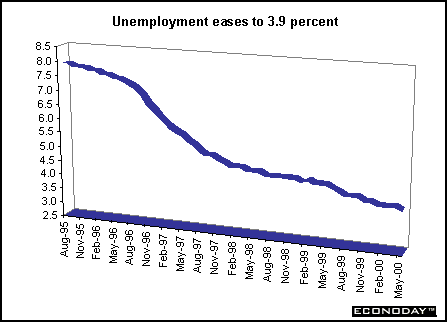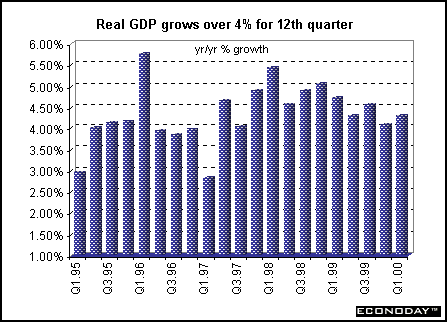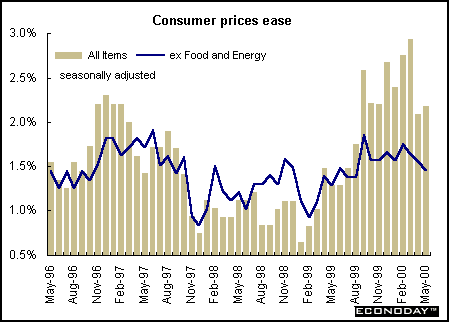| Previous Articles |
|
It's all
about interest rates and growth rate differentials
Europe and Britain
In Britain, benign inflation data along with other economic indicators helped the FTSE 100 move higher. The data, key for British monetary policy decision-making, showed a slowdown in growth, which may limit further interest rate increases. The FTSE 100 rose 82.20 points or 1.28 percent to end the week at 6526. The Frankfurt DAX and Paris CAC drifted downward as they absorbed the 50 basis point European Central Bank interest rate increase of the prior week. The markets also continued to take their cues from U.S. markets and the countdown to the Fed meeting. An example of U.S. markets' influence abroad occurred on Friday. The DAX caught a transatlantic chill in the afternoon and sank after U.S. investors began to fret about bank earnings and loan credit worthiness and the Dow plunged downward. On the week, the DAX sank 123.13 points or 1.7 percent to end at 7131.40, while the CAC fell 92.79 points or 1.42 percent to 6456.26. Asia
On the other hand, the Hong Kong Hang Seng continued its upward climb as U.S. economic growth slowed and perhaps put further interest rate increases on hold. With its currency linked to the U.S. dollar, Hong Kong must follow Fed moves. In the last three weeks, the index has risen 2711 points or just under 20 percent. Last week, the Hang Seng rose 314.12 points or 1.95 percent to close at 16,434.38, the highest since April 12th.
In other markets, the South Korean Kospi gave back all of the previous week's gains on profit taking and nervousness over the now completed meeting between North and South Korea. The Kospi closed down 77.36 points or 9.25 percent to end the week at 759.04. Americas
Currencies
The monthly European Central Bank report left the door open for future rate hikes but failed to stir much enthusiasm for the euro. The report noted that oil prices and the weak euro would continue to put upward pressure on consumer prices and that recent strong money supply and credit growth was due mainly to "robust" economic growth. This may suggest that further signs of above expected growth might require a monetary policy response. The yen is reflecting the uncertainty over the June 25 Japanese election, the eagerly anticipated quarterly Tankan index of business sentiment slated for release on July 4, and the Bank of Japan Monetary Policy Committee meeting that follows on July 17. All suggest that traders will be on hold for the next few weeks. Soaring oil prices are also weighing on the yen because of Japan's dependence on imported oil and the detrimental effects a protracted increase in prices would have for the fledgling Japanese economic recovery.
OPEC
looms, oil rises
After its March meeting, OPEC said that it would vary output by 500,000 barrels a day if the price of oil went outside a $22 to $28 per barrel range averaged over 20 days. The upper limit has been breached but no action has been forthcoming. Private output estimates show that the members are already producing above their self-imposed quotas. A further increase would push OPEC production close to its highest levels in 20 years. Indicator
scoreboard May retail price index excluding mortgages (RPIX), crept up 0.3 percent on the month and were up 2.0 percent when compared with last year. This is the 14th consecutive month RPIX has remained below the Bank of England's inflation target of 2.5 percent. The May retail price index (RPI) rose 0.4 percent on the month and was up 3.1 percent on the year. The retail price index which excludes both mortgage interest payments and indirect taxes (RPIY) rose by 0.4 percent on the month and was up 1.7 percent on the year.
May unemployment rate slipped to 3.9 percent. However, unemployment on the International Labor Organization measure in the three months to April fell by 60,000 on the previous quarter and was down 128,000 on the year. The ILO unemployment rate stood at 5.7 percent, down from 5.8 percent in the January to March period. Employment in the three months to April rose 112,000 on the previous quarter and was up 324,000 on the same period a year earlier. The employment rate now stands at 74.5 percent, up from 74.4 percent last month.
Average earnings in the three months to April climbed 5.1 percent, down from the 5.7 percent increase in the previous three months, although much of the deceleration can be explained by January's very high figure dropping out of the calculation. For the month, April average earnings rose by 4.4 percent when compared with a year earlier and lower than March's increase of 5.2 percent. This can be attributed to lower bonus payments, particularly in the financial services sector.
April seasonally adjusted retail sales volumes rose by 0.4 percent on the month and were up 3.6 percent when compared with a year earlier. In the three months to May, sales increased by only 0.2 percent on the quarter and by 4.2 percent on the year, the lowest quarterly growth rate since December 1998. Germany - April unadjusted merchandise trade fell to DM9.5 billion, down from the DM10.9 billion surplus in April 1999. When compared with last year, exports rose 8.8 percent and imports rose 12.1 percent. The April nominal, seasonally adjusted trade surplus fell to E5.2 billion, below the E5.5 billion surplus of April 1999. Seasonally adjusted exports were down 3.5 percent on the month while imports declined 3.2 percent on the month. May consumer price index was revised to down 0.1 percent but up 1.4 percent when compared with last year. Excluding energy prices, May CPI rose 0.6 percent when compared with May 1999. April real seasonally adjusted retail sales rose 5.5 percent and 1.6 percent on the year. April seasonally and calendar adjusted real retail sales - including auto and gasoline stations - rose 2.4 percent on the month and 1.5 percent compared to a year earlier. Italy - April seasonally and workday adjusted industrial production fell 0.7 percent from March. However, the adjusted annual gain was 8.3 percent, the strongest rise since December 1997. Spain - May consumer price index rose 0.2 percent on the month and 3.1 percent when compared with last year. Fuel and gasoline prices increased 1.8 percent on the month in May and were up 21.2 percent on the year, while energy products rose 1.4 percent on the month and 15.4 percent on the year. Core consumer prices, excluding energy products and non-processed food, were up 0.2 percent on the month and 2.3 percent on the year. April retail sales fell 1.9 percent on the month but rose 8.8 percent on the year. April food sales rose 1.9 percent on the month and 11.5 percent on the year. Asia
Hong Kong - April retail sales jumped 8 percent by value and 14 percent by volume. Both numbers were slightly below increases of 9 percent and 15 percent, respectively, posted in March. Durable goods sales leaped 23 percent, auto sales jumped 23 percent, and jewelry sales climbed 12 percent when compared with a year earlier. Australia - First quarter gross domestic product rose 1.1 percent from the fourth quarter of 1999 and 4.3 percent from the year earlier period. Gross national expenditure rose 1.2 percent in the first quarter from the fourth quarter and 4.1 percent from the when compared with a year earlier. The price deflator for private final consumption spending rose 0.5 percent in the first quarter and a rose 0.3 percent from the year earlier quarter. The GDP deflator rose 0.9 percent in the first quarter and 0.7 percent when compared with a year ago.
Americas May not seasonally adjusted consumer price index jumped 0.5 percent thanks to higher prices for travelers' accommodations, fresh fruit and vegetables, gasoline, natural gas and mortgage interest cost. The increases were countered in part by declines in clothing and automotive vehicle insurance premiums. On the year, the CPI rose 2.4 percent. When compared with last year, seasonally adjusted CPI rose 2.18 percent while the seasonally adjusted CPI excluding food and energy rose 1.45 percent. The Bank of Canada's inflation target range is one to three percent.
BOTTOM LINE As the clock ticks down to the Federal Reserve Open Market Committee meeting on June 27 and 28 the world's investors will be watching and waiting to see what the next interest rate move will be. Looking Ahead: June 19 to June 23, 2000
|
||||||||||||||||||||||||||||||||||||||||||||||||||||||||||||||||||||||||||||||||||||||||||||||||||||||||||||||||||||||||||||||||||||||||||||||||||||||||||||||||||||||||||||||||||||||||||||||||||||||||||||||||||||||
